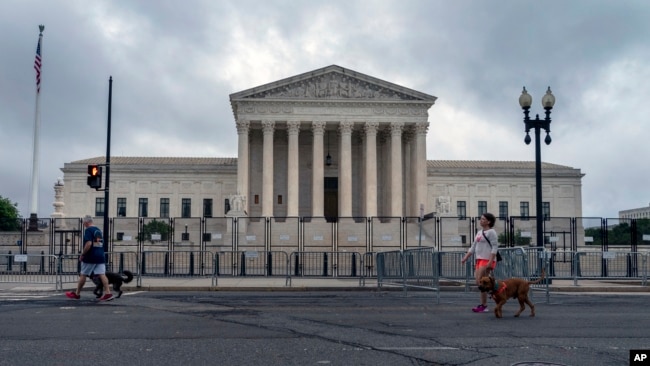米連邦最高裁の決定の波紋
公共の場でも自由に携帯可能となる銃、もうアメリカには行かないかな?
VOAで英語を学びましょう!!
米連邦最高裁、ニューヨークの公共の場での銃の使用制限を無効と判断(和訳)
US Supreme Court Strikes Down New York Limit on Guns in Public
June 24,2022
米連邦最高裁判所は木曜日、公共の場で銃を携帯するために特別な理由を必要とするニューヨークの法律は違憲であるとの判決を下しました。
この判決は、同様の法律を持つ州における銃の権利を大きく拡大するものです。また、銃刀法の問題や銃暴力に対する懸念で政治的分裂が起きている中での判決でもあります。
テキサス州ウバルデの小学校やニューヨーク州バッファローの食料品店などで最近起きた銃乱射事件を受け、同裁判所は6対3の判決を下しました。また、この判決は、米国議会が銃に対処する法律の制定に取り組んでいる最中に出されたものでもあります。
クラレンス・トマス判事は、多数派の意見を述べました。同氏は、合衆国憲法は "個人が家庭外で自衛のために拳銃を携帯する権利 "を保護していると述べました。
裁判官の大多数は、公共の場で銃を携帯する許可を得るために、”適切な理由”または特定の必要性を示すことを要求するニューヨークの法律を打ち破りました。判事らは、この要件は”武器を保持し負担する”という憲法修正第2条の権利と憲法修正第14条に違反すると指摘します。
スティーブン・ブレイヤー裁判官と他の2人の裁判官は、多数決の判決に反対しました。彼は、「今年(2022年)に入ってからだけでも、すでに277件の銃乱射事件が報告されています—1日平均1件以上—です。」と書いています。
民主党所属のニューヨーク州知事キャシー・ホーチュル氏は、裁判所の判決は痛みを伴う時期に出たと述べています。同州はバッファロー地域の食品店で起きた銃乱射事件で10人が死亡し、まだ喪に服していると言います。
彼女は、この判決を“reprehensible” 、つまり批判されるべきものだと呼んでいます。また、彼女は「ニューヨーカーが望んでいることではありません。 」とも言っています。
同じく民主党のジョー・バイデン米大統領は、「この判決は常識と憲法の両方に反しており、我々全員を深く悩ますはずです。」と述べています。彼は、バッファローとユバルデでの銃乱射事件の後、"...我々は、我々の仲間のアメリカ人を守るために、社会としてもっとしなければならない-少なくではなく-"と付け加えています。
ウェイン・ラピエール氏は、銃の権利団体である全米ライフル協会の指導者です。彼は、今回の判決を "アメリカ中の善良な男女の勝利 "と呼んでいます。
彼は声明でこう述べました:「自衛の権利、家族や愛する人を守る権利は、家で終わるべきではない。」と。
ニューヨークの法律は1913年から施行されています。この法律の”適切な理由”の要件に基づき、無制限の携帯許可証を求める人は、自衛の必要性を示さなければなりません。また、州当局は、狩猟、標的射撃、仕事場への往復など特定の目的のために武器を携帯する制限付き免許を与えています。
銃器安全団体や銃規制活動家たちは、ニューヨークの法律に反する判決が出れば、街中に銃が増え、暴力犯罪の発生率が高くなると懸念していました。また、空港、裁判所、病院、学校などの微妙な場所での銃の使用禁止も、このような判決によって危うくなるのではと懸念しています。
今回の判決は、高等法院にとって10年以上ぶりの銃に関する重大な判決です。この判決は、カリフォルニア、ハワイ、メリーランド、マサチューセッツ、ニュージャージー、ロードアイランドなどの州に住むアメリカ人に影響を与えます。これらの州にはニューヨークと同様の法律があります。
最高裁が最後に銃に関する重大な判決を下したのは2010年です。その判決と2008年の判決で、最高裁は、自衛のために自宅に銃を保持する権利を全国的に確認しました。木曜日の判決では、家庭外での銃の携帯の権利を拡大しました。
銃の権利を拡大する裁判所の決定は、銃の法律が政治的な問題として熱い論争を呼んでいる中で行われました。
2021年のピュー・リサーチ・センターの調査によると、アメリカ人の半数以上、53%が銃刀法を現在より厳しくするべきだと答えています。同調査によると、その意見は民主党員および民主党寄りの無党派層の81%が持っていました。しかし、共和党員や共和党支持者の20%しか賛成していませんでした。
US Supreme Court Strikes Down New York Limit on Guns in Public
The U.S. Supreme Court ruled Thursday that a New York law requiring a special reason to carry a gun in public is unconstitutional.
The decision represents a major expansion of gun rights in states with similar laws. It also comes when there is political division over the issue of gun laws and concerns over gun violence.
The court’s 6-3 decision follows recent mass shootings in such places as an elementary school in Uvalde, Texas, and a food store in Buffalo, New York. The ruling also was issued as the U.S. Congress is working on legislation dealing with guns.
Justice Clarence Thomas wrote for the majority. He said that the U.S. Constitution protects “an individual’s right to carry a handgun for self-defense outside the home.”
The majority of justices struck down a New York law requiring people to show a “proper cause” or specific need in order to get a permit to carry a gun in public. The justices said the requirement violates the Second Amendment right to “keep and bear arms” and the Fourteenth Amendment.
Justice Stephen Breyer and two other justices disagreed with the majority’s ruling. He wrote, “Since the start of this year alone (2022), there have already been 277 reported mass shootings—an average of more than one per day.”
New York Governor Kathy Hochul, who is a member of the Democratic Party, said the court’s decision comes at a painful time. She said the state is still mourning the deaths of 10 people in a mass shooting at a Buffalo-area food store.
She called the decision “reprehensible,” meaning it is something that should be criticized. She also said, “It’s not what New Yorkers want.”
American President Joe Biden, also a Democrat, said, "This ruling contradicts both common sense and the Constitution, and should deeply trouble us all." He added that, after the shootings in Buffalo and Uvalde, "…we must do more as a society - not less - to protect our fellow Americans."
Wayne LaPierre is a leader of the gun rights organization National Rifle Association. He called the court’s decision a “win for good men and women all across America.”
He said in a statement: “The right to self-defense and to defend your family and loved ones should not end at your home."
New York’s law has been in place since 1913. Under the law's "proper cause" requirement, people seeking an unrestricted concealed carry permit must show a need for self-defense. State officials also gave restricted licenses to carry a weapon for specific purposes such as hunting, target shooting, or going to and from their place of business.
Firearms safety groups and gun control activists feared that a ruling against New York’s law would lead to more guns on the streets and higher rates of violent crime. They feared that such a ruling could endanger bans on guns in sensitive places such as airports, courthouses, hospitals and schools.
The ruling is the high court’s first major gun decision in more than 10 years. It affects Americans living in several states including California, Hawaii, Maryland, Massachusetts, New Jersey and Rhode Island. These states have similar laws to New York’s.
The Supreme Court last issued a major gun decision in 2010. In that decision and also in a ruling in 2008, the justices confirmed a nationwide right to keep a gun at home for self-defense. In Thursday’s decision, the court expanded the right to carry a gun outside the home.
The court’s decision to expand gun rights comes as gun laws are a hotly disputed political issue.
A Pew Research Center study in 2021 found that over half of Americans, 53 percent, say gun laws should be stricter than they are currently. The study said that opinion was held by 81 percent of Democrats and Democratic-leaning independents. But only 20 percent of Republicans and Republican supporters agreed.
Words in This Story
proper –adj. correct based on social or moral rules
contradict –v. to not agree with in a way that shows or suggests something is false
concealed –adj. hidden from sight
